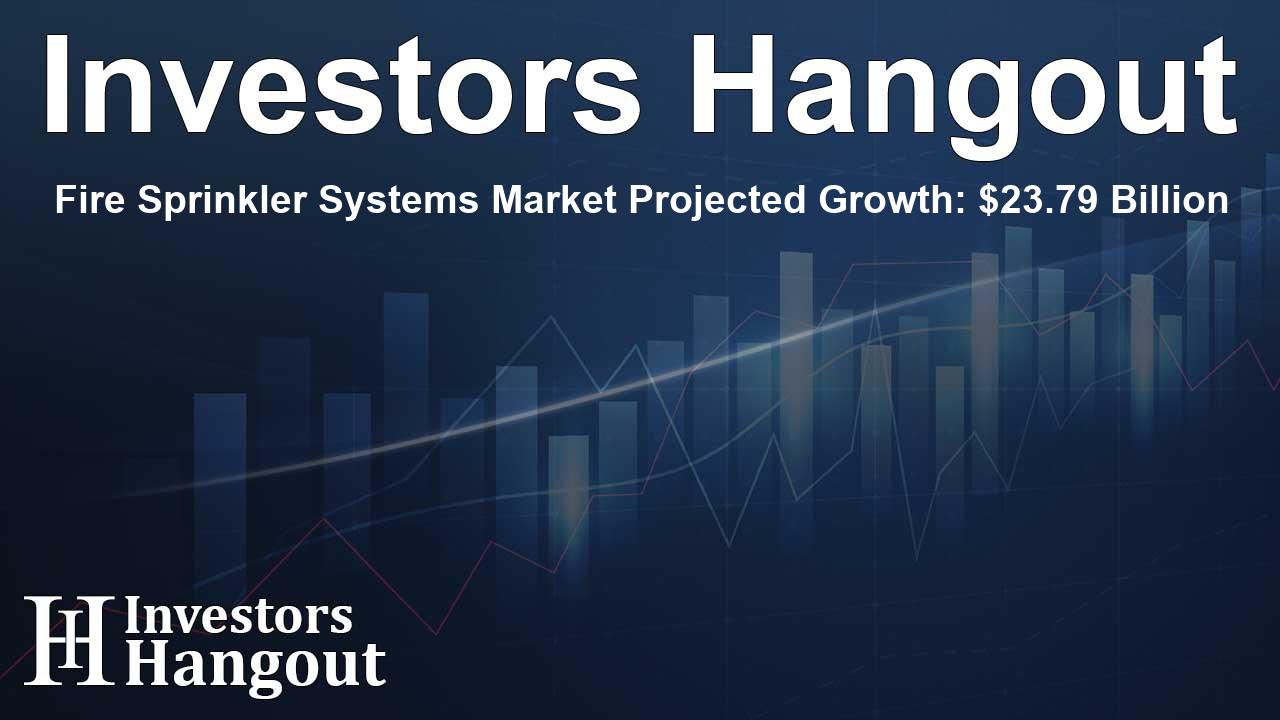Fire Sprinkler Systems Market Projected Growth: $23.79 Billion

The Growing Demand for Fire Sprinkler Systems
As the demand for enhanced safety measures soars, it has become clear that fire sprinkler systems are not just a luxury but a necessity. Recent projections indicate that the market for these vital safety systems is set to exceed USD 23.79 billion by 2032. This growth is largely fueled by urbanization and an increase in the global population, which creates a pressing need for reliable fire protection solutions.
Urbanization: A Major Catalyst
With more than half of the world's population currently residing in urban areas, the scale and density of living are transforming. As cities expand and high-rise structures become more commonplace, the importance of advanced fire protection systems, including fire sprinklers, cannot be overstated. These systems are essential in ensuring safety in residential buildings, commercial spaces, and industrial facilities alike. With regulatory standards evolving, many builders and property owners are focusing on installing or upgrading fire sprinkler systems.
The Importance of Regular Maintenance
The service segment for fire sprinkler systems is also expected to grow rapidly until 2032. Regular maintenance and inspections of these systems are vital to ensure their proper functioning. This includes servicing both residential and commercial systems, which often require comprehensive upkeep due to increased complexity. Awareness of safety regulations is pushing property owners to invest in reliable service packages that ensure their systems remain compliant and effective throughout their operational life.
Specific Market Segments on the Rise
Among the various options available, deluge sprinkler systems are gaining traction due to their effectiveness in high-risk environments. These systems discharge large volumes of water quickly, making them essential in places like chemical facilities and large industrial plants. With an uptick in industrial fire incidents, the demand for deluge systems is on the rise. Their ability to rapidly cover extensive areas ensures that fires are suppressed efficiently, saving both property and lives.
Fire Safety Regulations in Europe
In Europe, the fire sprinkler systems market is expected to experience steady growth driven by stringent fire safety regulations. Countries such as Germany, France, and the United Kingdom are recognizing the need for fire safety measures, prompting substantial investments in new installations and upgrades of existing systems. With innovative technologies emerging, including smart fire protection systems that enhance detection capabilities, Europe is becoming a key player in this increasingly competitive market.
Key Players in the Market
The landscape of the fire sprinkler systems market is populated by notable companies such as Johnson Controls International plc, Siemens AG, and Honeywell International Inc. These organizations are leveraging strategic partnerships and acquisitions to expand their offerings and explore new market territories. Additionally, they are focusing on providing integrated solutions that encompass maintenance and monitoring services, thereby enhancing their service portfolio.
Commitment to Sustainability
In line with global trends, many companies are emphasizing sustainability in their product offerings. This involves aligning their systems with environmental goals and regulatory requirements, which is becoming increasingly important for consumers. As competition grows, focusing on sustainable practices not only helps meet regulatory standards but also appeals to a more environmentally conscious marketplace.
Frequently Asked Questions
What drives the growth of the fire sprinkler systems market?
The growth is primarily driven by urbanization, increasing fire safety regulations, and the need for effective fire protection in various sectors.
What are deluge sprinkler systems?
Deluge sprinkler systems are designed to release large volumes of water over substantial areas and are typically used in high-risk environments like industrial facilities.
How important are regular maintenance services for fire sprinkler systems?
Regular maintenance is crucial to ensure that fire sprinkler systems operate effectively and comply with safety regulations.
Which regions are experiencing growth in fire sprinkler systems?
Regions such as Europe, particularly Germany and the UK, are seeing significant investments in fire protection systems due to stringent safety regulations.
Who are the major players in the fire sprinkler systems market?
Major players include Johnson Controls International plc, Siemens AG, and Honeywell International Inc., among others, all of which are expanding their offerings and services.
About Investors Hangout
Investors Hangout is a leading online stock forum for financial discussion and learning, offering a wide range of free tools and resources. It draws in traders of all levels, who exchange market knowledge, investigate trading tactics, and keep an eye on industry developments in real time. Featuring financial articles, stock message boards, quotes, charts, company profiles, and live news updates. Through cooperative learning and a wealth of informational resources, it helps users from novices creating their first portfolios to experts honing their techniques. Join Investors Hangout today: https://investorshangout.com/
Disclaimer: The content of this article is solely for general informational purposes only; it does not represent legal, financial, or investment advice. Investors Hangout does not offer financial advice; the author is not a licensed financial advisor. Consult a qualified advisor before making any financial or investment decisions based on this article. The author's interpretation of publicly available data shapes the opinions presented here; as a result, they should not be taken as advice to purchase, sell, or hold any securities mentioned or any other investments. The author does not guarantee the accuracy, completeness, or timeliness of any material, providing it "as is." Information and market conditions may change; past performance is not indicative of future outcomes. If any of the material offered here is inaccurate, please contact us for corrections.